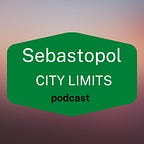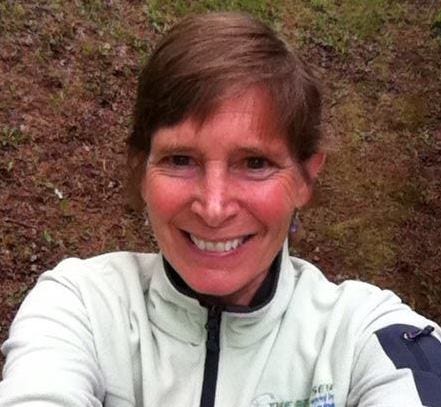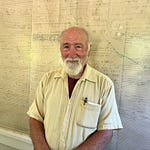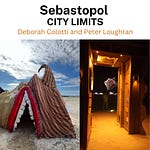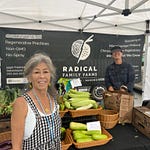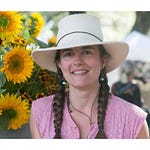Joan Churchill, the Executive Director of the Sebastopol Area Senior Center, joins me to talk about the programs and activities for seniors as well as some of the issues that impact seniors in our community — even who identifies as a senior these days.
Before we dive into the interview, I want to highlight a few news items from our conversation.
The Harvest Cafe inside the Center re-opens today for lunch from 11am to 1pm Monday through Friday. Member and non-members are both welcome. Takeout is also available.
On Thursday, the Senior Center is holding an open house from 4 to 6pm.
On September 17, there’s a fundraiser called “Aged to Perfection” with dinner at Blue Ridge Kitchen and music by “Pride and Joy” from San Francisco.
More information can found at Sebastopol Area Senior Center.
Transcript
Joan: I've been talking about the new old and the old old. There's a whole bunch of us who don't think we're old. And we're so fortunate to have good health and be running around. And it's like the senior center is in some ways a place for older teenagers.
Then there are a group of what we might consider the older, old people who have developed vulnerabilities and need some support.
Dale: I'm Dale Dougherty, and I'm joined today by Joan Churchill, who is the Executive Director of the Sebastopol Area Senior Center. Welcome Joan.
Joan: Hi, Dale. So nice to be with you today.
Dale: I looked up a little bit of bio on you and you actually have a kind of an interesting start to your life, don't you? As a young person.
Joan: Yeah it's not traditional middle class. That's for certain, it was below working class and crawling out to be who I wanted to be.
Dale: You grew up in the east coast, right?
Joan: Grew up in the east coast in a old mill town, French Canadian, Catholic heritage. My grandmas and grandpas all came from Canada and I moved to Maine when I was 17. And I was a fish out of water in a city, which is why I just adore living in small communities and rural communities.
Dale: How did you get out to California?
Joan: When you lived on the east coast in the 1960s, California is the promised land. I have a sister who's two years older than me and she dreamt ever since she was a little girl of moving to California and she did back in 1980. So I used to visit her all the time and couldn't believe that there was this land where jade plants grow in parks and just a different world. And gosh, probably 20 years ago I read Charles Schultz 's biography and found out about Sebastopol and it was next door to where my sister lives in Santa Rosa. And I tried to bicycle so many times to the town and actually did once. And I never wanted to leave Sebastopol but of course I had a job and a family back on the east coast, but here I am now.
Dale: Oh, that's wonderful. So you're relatively new to the Sebastopol Area Senior Center. Is that right?
Joan: Yes, I've been on for less than a month. Mentored wonderfully by our last Executive Director, Katie Davis. And we are a tiny organization, but a powerhouse, the senior center has been around since 1969 and it was a different world back then.
The property was given to the city by people who had passed and they had to keep it as some sort of services for senior citizens. So that's how it started. And it had gone through many different ways of doing that throughout the years. Around 2000, the organization decided to make a bigger stand.
They renovated the building with almost $2 million of funds that they themselves raised and enlarged the building at the same time and change the name. It used to be known as Burbank Senior Center or something like that. And now it's the Sebastopol Area Senior Center. We're toying with -- there's a lot of baby boomers who don't consider themselves senior citizens, no matter how old or young they are.
Yes. We are toying and we're probably gonna have a survey to find out what's the best name for us now. Because we want people to know that we are here on behalf of making sure that people who consider themselves older, retired, semi-retired, whatever. There's a place for them and a place for their caregivers and friends.
Our board is in the midst of a strategic plan and they're really focused on inclusion, including intergenerational and the research on how people from different generations and people from different socioeconomic blending can have the opportunity to mentor young people, especially so that they can open doors and just, so those are the types of things we're really interested in forwarding.
Dale: That's a wonderful direction. It's something that cities should offer is that we have ways to meet people outside our own age, background, status, whatever it is you want to use there and bringing together especially old and young coming together in new ways.
Joan: Yeah, I completely agree. One really exciting thing that's happening on Monday is we are reopening our Harvest Cafe. Right now it's only gonna be open from 11 am to 1 pm Monday through Fridays. Right now it's planned to be for two weeks, it's the same menu. There's three different things on the menu.
It includes an soup or salad, then the main thing and then dessert. It's very affordable. People who are members can join and partake and people who aren't members can come on in. And it's also takeout. And we do this, as many senior centers do around the country is to have a place that is fairly affordable, especially for people on fixed incomes, to socialize and meet new friends.
Oftentimes when people aren't in the workplace anymore, they really don't know how to go out and make friends if you will or just have a place to go where they know they can do this and it's not gonna break their bank account. So we are tremendously excited. We have a wonderful chef, Terri Condon, who rejoined our organization and we are really into the most high quality foods that we can possibly provide. And it's just gonna be a really fun thing.
Dale: Is this something this senior center did before and is coming back or is this new?
Joan: During our history, we've likely always had meals, but they were provided by different entities. Since right before COVID we were providing lunches ourselves and then during COVID we brought lunches to people that we knew were vulnerable, which is what a wonderful thing to do. And then we started up again and found that we had such demand.
We didn't have enough space and we didn't have enough tools. So our board, I think it was over $300,000 worth of renovations that we just did so that we have a really high end commercial kitchen. More space so that we can have more people coming. So really excited and it opens up Monday and a soft open. And then once we make sure everything's perfect, we're gonna have a nice op grand opening for that.
Dale: That's great. You have to send me a menu.
Joan: It's going to be great and very yummy.
Dale: If you don't know where the senior center is located, you could go to the library and cross the parking lot and hit the senior center.
Joan: Absolutely. It's a lovely blue, light blue building. It's so homey looking on the front, we have a great garden that we're gonna be retooling at some point, but it's lovely as it is.
Another thing that's happening next Thursday, the 25th is we are having an open house from 4 to 6 pm and everyone's invited. We just ask that people give us a ring and RSVP. So we know how many people will be with us. And it's an opportunity. All our staff will be there. Most of our board members will be there to hear about all of the great programs that we have. But I am going to, if you ask, tell you about some of them at the same time.
Dale: Let me ask a question before you dive into that. What's the relationship to the city?
Joan: There is a relationship to the city, so the city owns the property and has since 1969, even though we've done tremendous renovations on it. They are wonderful landlords. They rent us the property for a dollar a year so that we just have to pay all of the operational costs of the building to keep it affordable.
If there's something wrong with the painting or the exterior stuff, they take care of that, which is really great. And they give us a small gift every year to help us with operations too.
Dale: Mostly you depend on outside donations to support you.
Joan: Oh, absolutely. yes, but one thing, and I'm so glad you're talking about something like that. It's perfect for what I was gonna say. We were gifted, we and the city, the property, as I mentioned in 1969 and approximately well, 25 years ago, which we can do the math in a minute. We were gifted another great thing.
And that was a donation from someone who visited Sebastopol, but their house was someplace else in California. Apparently it was this great big three story home. And the woman was a seamstress and she was also apparently a pack rat in terms of, she loved the fabrics and the bobbins and everything that goes with sewing and her house was completely full. When she passed, her executors didn't know what to do with the stuff. Somehow they came to us. We started a store. It's called The Legacy. We've been operating it for 25 years. And right now it provides us with about 40% of the revenue that we have, and we're almost up to a million dollars.
It is absolutely amazing. My understanding is it's the go-to place for people in the North Bay. If they wanna find the best kinds of fabric wall, things for craftspeople buttons. Apparently we have, we have buttons that no one else has in the world, you know? So people who are artisans, they come and find us.
That's open Monday through Saturday because we're a largely volunteer oriented. We're closed on Sundays, but it's a wonderful way to serve the community in many ways and to support our center.
Dale: Now you were going to talk about some of the programs.
Joan: Yeah. We also offer a lot of classes and courses and things like that. We run Tai Chi classes for people who are doing sitting Tai Chi. We do some yoga classes. We did a lot of these on zoom over COVID and some of them were keeping like that because it really allows people who it's just too hard for them to move their bodies over, but they can participate if they're still doing Zoom.
So we're trying to do as many of that as we can based on demand. So we'd really like people to tell us what they want and what they prefer. We're doing this program called SAIL (Stay Active and Independent for Life) but what it is to help people with balance and it's led by a physical therapist and it offers education and skills development so that people can strengthen from where they are.
We're going to be in September, offering some screening, some free screenings with a whole bunch of different health professionals. . So if someone is worried about either their parent or themselves with the risk of falling, we can help them in terms of, do they need immediately referrals to doctors for something that they don't even know they have yet, or, would our program be the best for them or whatever kind of level of care might be helpful for them.
We we do anything that someone says we'd like to do with class and you have space in a room. I'm gonna just click right now and see what our current offerings are for that. For this month, we've got collage journaling, watercolor, bridge, gentle yoga, sitting Tai Chi, the balance classes.
We have introduction to cannabis on here.
It's all on our website, but, and it's constantly changing, but the things that people want to do, like Tai Chi and yoga and things like that they're typically always on. It's just a nice way for people to keep learning about things and doing something for their health.
Dale: Let's talk about health for a bit. COVID obviously impacted everybody but the elderly in our community were the most vulnerable to COVID. That must have changed a lot of what the senior center could do over the last two years?
Joan: Yes. They actually had to close, take that terrible pregnant pause in March and April of 2020. And this place from my understanding came back booming in offering meals and Zoom classes.
And of course our website for people who are comfortable using a website was a real help in showing all the resources and referrals. That's another thing that we do is we help to open doors for people when they have a need for something. And our reception still in a big spacey room with as much ventilation, so people could still call us, but it was a different time. We right now require people to be vaccinated, to come into our place. And I'm actually looking at that right now because I just read that the rates of transmitting COVID are pretty much the same regardless, but what you get if you are vaccinated is incredibly lower.
So it's such a thing. And you'll probably keep things just as they are for the longest time, but we don't wanna put a barrier up to people accessing.
Dale: Do you find people are coming back to the senior center?
Joan: Oh yes. Oh yes. Half our members bring masks and wear their masks. And half of them don't. We don't require that they wear a mask because we don't have to, but we love that they do, because we know that they're trying to take care of themselves. We're gonna start really making sure that all of our spaces have just the best ventilation that we possibly can afford. Do that extra thing as the weather changes and we might have doors closed more. We just wanna make sure everything is as safe as possible. It's great to have people back and great to see smiling faces. Again, that was one thing that was hard to see for the last two years.
Dale: COVID isolated all of us in different ways and it's really great to be connecting.
Joan: Yep. Yeah. And supposedly the things that I've read. And my mentor with that is Mary Piper, a psychologist, talks about shared trauma and that it's not necessarily one to one counseling that people need. It's exactly what you just mentioned.
It's people getting together and laughing and being together and then getting their basic needs met. But once that's met, it's being together and being able to talk about things. And that is often equally beneficial to the group of people who are traumatized by something.
And, so it's everything that we can do to bring people together in a safe place is what we wanna do.
Dale: Yeah, that's great. Something that also applies, I think you mentioned it, but it's almost an unexpected thing growing up, getting older is that is elder care taking care of your parents or taking care of other people in the community that are older almost in the way you had to take care of your children.
Joan: Exactly.
Dale: But different. Time consuming. Frustrating sometimes. And there aren't often easy answers. That's something that must cross through the senior center a bit.
Joan: Oh, it does incredibly. And I've been talking about the new old and the old, old. There's a whole bunch of us who don't think we're old. And we're so fortunate to have good health and be running around. And it's like the senior center is in some ways a place for older teenagers. Some people don't have jobs anymore or they have part-time jobs or whatever, but they really wanna have fun. They don't have all this kid obligations and things like that.
So it's a time to really express. And then there are a group of what we might consider the older, old people who have developed vulnerabilities and need some support. And many those folks, cuz they've lived to be much long, older that are also could be considered senior citizens.
It is a pickle and we really hope it doesn't matter if you're 40 years old and your parent is facing some vulnerabilities. We wanna be one of the calls that you can make. We don't have social workers, but we do have incredible amount of resources to help people get on their way. And if they've found dead ends, they could call us back and we could see what else we can do. There are organizations that do have case managers and for when people need that level of support and stuff like that.
Dale: There is a level, especially among the elderly. Sometimes they just don't know who to call.
Joan: Or they're afraid of asking the wrong question or that people aren't going to be nice to them. And I think what senior centers probably throughout the country, but ours especially is that we are so welcoming and friendly.
You make a phone call to us. You're gonna get nice, happy people. They will answer every question that you have to the best of their ability. I think that's the great thing about senior centers is that they're welcoming. That's what they want to do is to help.
Dale: And you mentioned that a focus on inclusivity too, and bringing, the diverse threads in our community together.
Joan: So we are really excited about that and we are starting to make connections with different entities and organizations. And when I think of having young people help. Right now, we have some volunteers who are helping older people learn how to use their Macintosh or their cell phones, but I can't wait till we can get a whole corral of young people.
They might be 10 years old and teaching someone, or they might be 14 years old. We don't know yet. But really helping to teach. On the other end, that person who's doesn't know anything about a Mac may know everything there is about fixing engines and that might be something that other person's interested in or making really great cookies or something.
So that's that cross collaborative...
Dale: Another side is even knowing the community and its history, right?
Joan: It's the the living history project, but we don't want to say because I would think, oh, you would ask questions and they would write, they would tell you and you'd be writing notes or using a microphone.
But the young people know all the different tools. I do not know what they are and they will be able to tell us how they might do it. It might be through art. It might be through some kinds of technology things that I don't know the names of yet. It could be in so many different ways.
In preparing to work in Sebastopol, I read a couple books on the history and the Gravenstein apples, and this was a different world.
So people who are 70, eighties, in their nineties, really saw a different world. People who are sixty saw a different world than what is on Main Street. I think that would be so wonderful. And then they can show us how to hook these up to everyone else's websites, yeah. So I'm really looking forward to that.
Dale: It, it does remind us of the pace of change.
I know you're new to the position, but what are some of the goals you might have for the senior center, things that you wanna make your mark on it and help it go forward. Recognizing also some of the needs it must address.
Joan: Now I, my guess is, and this is completely a guess because I've always worked in areas that had significant poverty or people who were just on fixed incomes without any other assets to help them along. My guess, is people here hide their limited income much more than they might someplace else, because there is a vibrant community of people and restaurants and every, you know, this place is geared, this part of California is geared to people who have a lot of disposable income. So my guess that's just my guess and I could be wrong, but I don't think I am and we just need to find those folks so that we can make sure that they have as much support as that we can, we meaning the community of "We's" and all of systems can help them.
Dale: That's a very thoughtful response. With inflation and the cost of living going up so high. And they can't do much about that. That's a very difficult position to be in.
Joan: The other thing is because I'm fairly new to California, in this part of California and it's just making sure, and it might just be learning for me that the elders, if we have to quickly leave our homes. Yeah, because of a smoke or fire event. I just need to be convinced that we know where every single person lives and that they can get out of their houses.
Dale: Yeah. I've written about it and involved a little bit myself. There's something called meet your neighbors, MYN.
Some other things. And I just to give anyone listening here a little bit, it's in your neighborhood who those people are that might need assistance. During evacuation or because power goes out , you might not know them very well or haven't interacted with them, or they could have had a change in health that you aren't aware of. And if anyone was here, a lot of people were here during the fires, they come down the street and they shout time to leave. They don't check that you leave. They don't see who stays behind.
Joan: And you've made a point with people's conditions changing, people can have a fall and they were healthy and strong and now they're not quite that way anymore.
Dale: So that's why you don't see them on the street anymore.
Joan: So I think you're right to reach out to your neighbors now while there's no smoke around and just see how people are doing.
I know when I moved here and worked In Healdsburg, our finance officer lost her home in Ukiah, the same date as the 2017 and her neighbor to the north and to the south of her did not make it out of their road. And, if they had these preventative programs, like they started immediately, would that have been different? Who knows? No one will ever know, when I hear what you were saying and what Sebastopol has done. It just reinforces for me to have that conversation, see how people are doing before.
Dale: Is there anything else coming up that you wanna talk about? You have something in September.
Joan: We have our biggest fundraiser in September. It's called, I love the name. It's called "Aged to Perfection.". And this time we're having a really great band. Pride and Joy. They're out of San Francisco and I guess they're tremendously well regarded. We're gonna be at one of the venues at the Barlow. And we are going to have a wonderful catered meal and there'll be opportunities to be able to win a raffle or win somehow a bid.
I think maybe it's a bid for a whole bunch of wine that is not on the market. It's just a way to support our organization so we can do all the great things that we're doing. And, with just hopes for the future that we'll be even more dynamic than we have been, which has been pretty darn dynamic.
Dale: Good. Joan, thank you for your time today. I learned a lot about the senior center and I hope others did as well. And I wish you luck in your continuing journey to, to lead the organization.
Joan: Thank you. It's been such a pleasure, Dale. Thank you so much.

